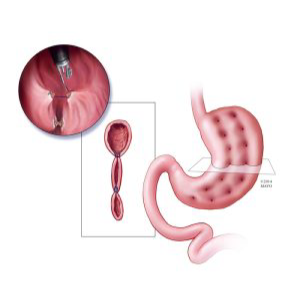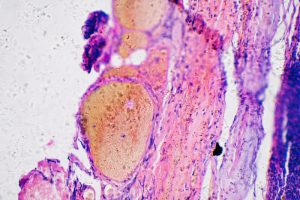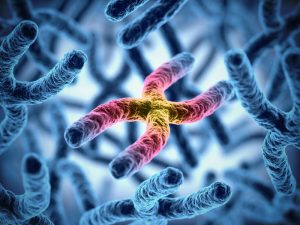Finding answers to challenging conditions
These new technologies show promise and the importance of a collaborative approach:
Endoscopic treatment of obesity
 An innovative medical device developed at Mayo Clinic by Barham Abu Dayyeh, M.D., and team to treat Type 2 diabetes, obesity and metabolic disease is showing promise for patients.
An innovative medical device developed at Mayo Clinic by Barham Abu Dayyeh, M.D., and team to treat Type 2 diabetes, obesity and metabolic disease is showing promise for patients.
The device is placed through minimally invasive surgery as an outpatient procedure. The method recently received De Novo classification from the Food and Drug Administration, and recent Mayo Clinic findings were published in The Lancet.
The technology’s advancement is made possible by a partnership that includes Mayo Clinic Ventures, Mayo Clinic Research, the Department of Surgery, and the Division of Gastroenterology.
Cancer treatment innovation

Cancer cells under a microscope
Based on encouraging results in early clinical trials, Mayo Clinic Ventures collaborated with a biotechnology company to lead the development of an antibody-drug-nanoparticle albumin-bound (nab) immune complex (ADNIC) technology invented by Svetomir Markovic, M.D., Ph.D., Wendy Nevala and team for treating a spectrum of cancers. The technology platform is protected by an intellectual property portfolio comprised of 17 patent families, 32 patents granted to date with life through at least 2035, and another 135 patents pending.
The ADNIC technology is currently in clinical trials for multiple products in a variety of cancers, including ovarian, endometrial, and multiple lymphoma subtypes.
Gene therapy for rare, fatal genetic disease

Gene therapy; chromosomes 3d illustration
Propionic acidemia, a rare and fatal genetic disease that often sickens babies in their first days of life, occurs in 1 in 100,000 live births in the U.S. There is no cure, with current treatment options limited and not delivering the long-lasting benefits that patients and their families seek.
Michael Barry, Ph.D., and his team with the Center for Individualized Medicine have developed a technique to replace the defective genes that cause the disease. The therapy has been granted FDA Orphan Drug and Rare Pediatric Disease designations.
Mayo Clinic will continue to transform health care proactively through disease interception, early detection and treatments. Cures for rare and complex conditions is an endless pursuit.
Continuing the search for answers
Mayo Clinic will continue to work to transform health care through early disease detection and innovative treatments. Finding cures for rare and complex conditions is a never-ending pursuit.
Mayo Clinic has research and financial interest in the technologies referenced in this article. Mayo Clinic will use any revenue it receives to support its not-for-profit mission in patient care, education and research.
Share this story
